Eczema is a condition of the skin that can affect it in a number of ways and cause symptoms such as irritation, inflammation, swelling and itching. This type of skin disorder can develop in individuals belonging to all races, ethnicity and age groups. However, individuals with a family history of the skin condition, infants and young children up to the age of five years and those with allergic disorders like hay fever and asthma are at increased risk to develop eczema.
Eczema is also referred to as dermatitis and can affect various body parts in children primary on the cheeks, forehead, scalp, legs, forearms and neck. Adults can develop eczema on body parts such as the neck, face, and the insides of the knees, elbows and ankles.
When eczema is scratched to relieve the itching, then the skin can break up increasing the risk to infections by bacteria and other organisms, resulting in infected eczema.
Types of eczema
Eczema is a term that is generically used to describe a number of disorders affecting the skin. Hence, various types of skin condition can be termed as eczema, and when they develop secondary infections then they are referred to as infected eczema. Some of the common kinds of eczema are as follows:
- Atopic Dermatitis: It is the most common form of eczema with certain characteristics like inflamed and persistently itchy skin. It is a type of eczema that is more commonly found to affect those individuals with a family history of the disease and various allergies, and those with hypersensitive reactions to allergens. When an atopic dermatitis site is scratched and becomes infected, then it is also called infected eczema.
- Dyshidrotic Eczema: It is a skin condition that results in increased itching and irritation of the feet and hands often accompanied by the development of crater-like blisters that pain and itch. Dyshidrotic eczema with secondary infections is called infected eczema.
- Seborrheic Eczema: It is a type of skin inflammation that involves characteristics such as oily, yellow-colored, scaly marks or patches on the skin. Some of the possible causes of this type of eczema include presence of oily skin, certain types of climates, increased stress and excessive shampooing. Seborrheic with secondary infections is called infected eczema
- Contact Eczema: This type of dermatitis or eczema is characterized by symptoms such as itching, redness and burning sensations in the skin parts that have come into contact with certain allergens. It can also develop a secondary infection causing infected eczema.
- Nummular Eczema: It is a type of eczema characterized by prolonged inflammation of the skin and primary tends to affect the older adults on the back, arms and parts of the lower abdomen. Individuals with nummular eczema may elicit coin-shaped patches on the affected skin regions.
Symptoms of eczema
Some of the signs and symptoms of eczema are as follows:
- The symptoms of eczema differ from one affected individual to another. However, the common signs of this skin condition include scaly, dry skin with increased redness and severe itching. The affected areas of skin may experience burning sensations, oozing lesions, blisters and the formation of brownish grey or red patches.
- The abnormal patches and skin rashes may occur on any area of the body, but are more common to certain body parts such as the neck, face, feet, hands, wrists, arms, and in the hollows of the upper chest, ankles and knees.
- When individuals with eczema engage in scratching to relieve the itching, then the skin may develop open wounds. Such damaged skin can then develop secondary infections which can result in symptoms such as fever, headache, chills, muscle aches, etc.
Causes of eczema
- The exact causes of eczema are still a subject of research. However, it is believed that the skin disorder may be caused by prolonged and chronic exposure to irritants such as soaps, poison ivy, detergents, nickel, battery acid, etc.
- Allergens present in the environment such as dust, pollen, smoke, etc., that result in allergic reactions are also known to cause eczema on the face and other body sections with exposed skin
- Excessive stress, hereditary reasons, mutations of genes, and alterations in the levels of humidity or temperature can also be considered as possible triggers of eczema
- When eczema is infected by secondary organisms like bacteria, then it can become infected eczema
Treatment of eczema
- Mild cases of eczema can be treated with natural treatment methods such as intake of red clover and omega 3 essential fatty acid that are naturally present in egg yolk, fish, nuts and dry fruits. One also topically use natural medicines such as witch hazel, neem oil and aloe vera creams on the skin areas affected by eczema.
- In case, natural therapy does not work, then one must visit a doctor. The doctor will prescribe eczema specific medications for treating the skin condition.
- Painkillers may be given for alleviation of pain.
- The doctor may also suggest sleeping pills for a sound sleep in case of severe itching
- Secondary infections that result in infected eczema may be treated with antibiotics and other drugs as diagnosed by the doctor
- One can aid the faster treatment of eczema by wearing loose clothes, avoiding allergens and excessive sweating, consuming plenty of water and maintaining personal hygiene.
Pictures of Eczema
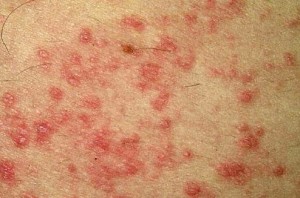 Atopic Eczema
Atopic Eczema
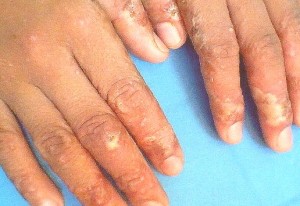 Dyshidrotic Eczema
Dyshidrotic Eczema
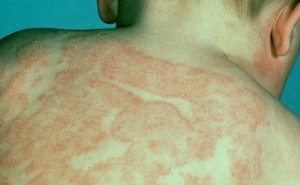
Contact Eczema
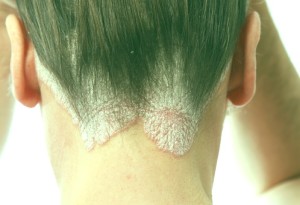 Seborrheic Eczema
Seborrheic Eczema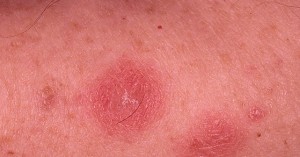 Nummular Eczema
Nummular Eczema
When I originally commented I appear to have clicked the -Notify me when new comments are added- checkbox and now whenever a comment is added I receive 4 emails with the same comment. Is there a means you can remove me from that service? Kudos!